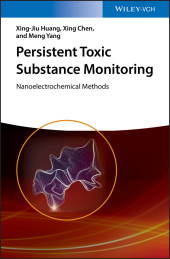 Neuerscheinungen 2018Stand: 2020-02-01 |
Schnellsuche
ISBN/Stichwort/Autor
|
Herderstraße 10
10625 Berlin
Tel.: 030 315 714 16
Fax 030 315 714 14
info@buchspektrum.de |

Xing Chen, Xing-Jiu Huang, Meng Yang
(Beteiligte)
Persistent Toxic Substance Monitoring
Nanoelectrochemical Methods
1. Auflage. 2018. XII, 536 S. 244 mm
Verlag/Jahr: WILEY-VCH 2018
ISBN: 3-527-34400-4 (3527344004)
Neue ISBN: 978-3-527-34400-0 (9783527344000)
Preis und Lieferzeit: Bitte klicken
Filling the urgent need for a professional book that specifies the applications of nanoelectrochemistry for the monitoring of persistent toxic substances, this monograph clearly describes the design concept, construction strategies and practical applications of PTS sensing interfaces based on nanoelectrochemical methods. The comprehensive and systematic information not only provides readers with the fundamentals, but also inspires them to develop PTS monitoring sensors based on functional nanostructures and nanomaterials.
Of interestto chemists, electrochemistry researchers, materials researchers, environmental scientists, and companies dealing with electrochemical treatment and environment.
1. Introduction
2. PTS in aquatic environment
3. Common electrochemical principles for PTS detection
4. Design concept of nanoelectrochemistry sensing interface
5. Selective adsorption leading to selective electrochemical response towards PTS: carbon based nanomaterials as samples
6. Facet and phase directed nanomaterials based sensing interface for PTS monitoring
7. Mutual interferences between heavy metal ions on the electrochemical nano-interfaces
8. Nanocomposites for electrochemical monitoring of PTS: design, preparation, and application
9. Nano-gap for detection of PTS
10. Determination of PTS using nanoelectrodes
11. Electrochemical assisted preconcentration for PTS detection
12. Conclusion and Perspectives
13. Index
Professor Xing-Jiu Huang is Vice Director of Hefei Institute of Intelligent Machines, Chinese Academy of Sciences. He completed his Ph.D. degree at University of Science and Technology of China in 2004. He then worked as a postdoctoral researcher in KAIST with Professor Yang-Kyu Choi, South Korea, during 2005-2008, and in Oxford University with Professor Richard Guy Compton, UK, during 2008-2010. Since 2009, Professor Huang has been admitted a Member of The Royal Society of Chemistry and was selected as the "Hundred Talents Program of Chinese Academy of Sciences" in 2011. He has authored over 100 scientific publications and received numerous scientific awards, including the Leading Talent in Colleges and Universities in Anhui Province, China, the 15th Scientific and Technological Award for Young Talents of Anhui Province (China) in 2013, Second Prize of Science and Technology Award of Anhui Province (China) in 2013, Second Prize of Science and Technology Award of China Association for Instrumental Analysis in 2014, and Excellent Graduate Advisor Award from Chinese Academy of Sciences in 2013 and 2015. Dr. Xing Chen is an Associate Professor of Hefei Institute of Intelligent Machines, Chinese Academy of Sciences. He received his M.S. and Ph.D. degree from Hefei Institute of Physical Science, Chinese Academy of Sciences, and he joined the Hefei Institute of Physical Science, Chinese Academy of Sciences in 2006. He has authored and co-authored 45 papers that published in peer-reviewed journals. He was awarded many awards, including second prize of Science and Technology Award of Anhui Province (China) in 2013, second prize of Science and Technology Award of China Association for Instrumental Analysis in 2014. Meng Yang got his B.S. degree in chemistry from Anhui Normal University, Wuhu, China, in 2013. Then he pursuited his Ph.D. Degree in University of Science and Technology of China, Hefei, China with Professor Xing-Jiu Huang. He has received some awards, including Chinese Academy of Sciences Dean Excellence Award, Ph.D. National Scholarship, and 2017 ORGANO (Water & Environment) Scholarship.His research interests mainly focus on the sensing nanomaterials, environmental electrochemical nanosensors, and electrochemical determination of persistent toxic substances.


